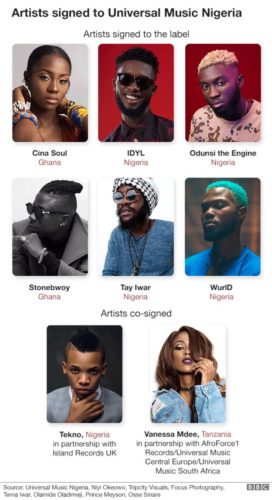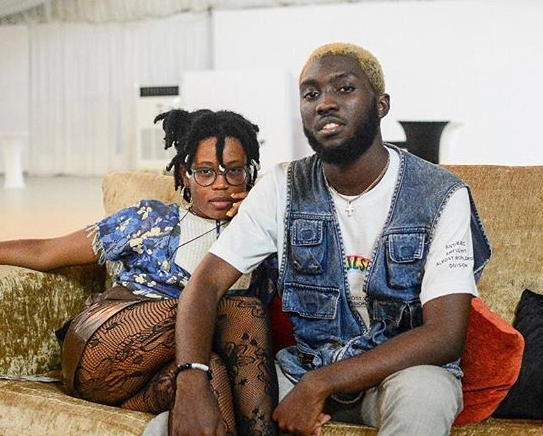Universal Music Group (UMG) recently set up shop in Nigeria, roughly two years after their rivals Sony Music Group acquired a Lagos address. However, unlike Sony whose strategy seems to be to headhunt the country’s established popstars, UMG is putting a lot of faith in artists that are at a different point in their careers, and that make a very different type of music.
Odunsi (The Engine), Tay Iwar and WurlD aren’t household names, yet, but they are among the pioneering acts on the UMG roster. They are also among a group of artists who seem to be recovering from a collective early-term identity crisis.

In the era of mp3 downloads, music blogs were responsible for bringing the internet’s attention to a generation of artists, and in some cases, ‘breaking’ them into the mainstream. By providing audiences around the world access to free music — and Nigerian artists, unfettered access to a global audience — sites such as NotJustOk and Jaguda served as a launching pad, or at the very least as facilitators, for a number of careers. But in the age of streaming, SoundCloud is replacing blogs as the main source of online music discovery. The popular free streaming service has been a game-changer particularly for independent artists, who’ve found a direct route to their fans that cuts out the gatekeepers and cuts down on marketing spend.
In Nigeria, many of SoundCloud’s early adopters were students and young creatives looking for avenues online to express themselves. The music they made was understandably experimental, the topics introspective, and their influences and audiences came from all over the world. These early adopters grew organically and set the tone for the visual and sonic representation of what a “SoundCloud artist” is, although that’s a tag that has since been flagged as being problematic. UMG executive, Joey Akan, recently confessed, “I once had a SoundCloud artist tackle me for using the ‘derogatory’ term.”
One of the problems with “SoundCloud artist” is that even as these musicians evolve in their careers, hone their craft and build fan bases outside of the streaming service, the tag continues to anchor them to their humble beginnings online. Even worse, it is sometimes weaponized to delegitimize their exciting movement.
Another popular tag that seems to have fallen out of favor with young indie artists is “New Age”; a term that, at least, seems to describe the style of music and the age group of its makers, rather than the medium through which it spreads.
Guardian Life recently ran a cover story on four artists, Lady Donli, Maka, Odunsi and Santi, and titled it “Vibes Of The New Age”. That cosign was one of the clearest indications that the mainstream media was catching on. But between those artists, Donli and Maka are arguably the closest in style, and even they didn’t fall from the same neo-soul tree. Donli is heavily inspired by Erykah Badu, that much is obvious in her music, while Maka has a stronger lean towards hip-hop fusion. Furthermore, they say a lady never tells her real age, so writers shouldn’t tell it on their behalf, but let’s just say both singers probably weren’t in senior secondary school at the same time.
A few months prior to sitting down for the story, Lady Donli had registered her displeasure with what she termed the “New Age narrative”, while the even more vocal Odunsi had already picked up a reputation for speaking against any wrongful portrayal of his generation.
The new UMG signing describes his own sound as “Afrofusion”, a mixture of diverse genres but with a strong Afrocentric, nostalgic core. Using his unique sound, Odunsi has emerged as one of the leaders of this era. One of his biggest records “Alté Cruise” has become an anthem for the movement, and the video, a depiction of their sub-culture.
The song pushes forth another tag, alté, into the lexicon used to describe, perhaps, an indescribable collective of artists.
DRB Lasgidi members Teezee and BOJ coined the term “alté”. Teezee explains that “alté” (short for alternative) is, “when something is different from the norm… an alternative to what is expected”.
Altè : when something is different from the norm , original, an alternative to what is expected.
Originated by (Teezee & BOJ DRB 2010)
It’s not a genre of music.— FreshPrinceOfLasGidi (@TeezeeDRB) August 8, 2018
The word was formed circa 2010, that’s around the same time Black Magic started gaining notoriety for pushing his brand of wavy, dark alternative music. The former Synik8 artist is credited with being a big influence on today’s movement sonically. All pioneers in their own right, neither artist could do anything to stop the term from inadvertently creating some form of music classism, due to the upper-middle-class backgrounds of those that identify with the sub-culture.
But the very essence of the movement is about to receive perhaps its strongest test.
As collaborations between Wizkid and Santi, Lady Donli and Mr. Eazi, and Odunsi and Davido begin to materialize, and as labels continue to circle around the movement’s brightest stars, “alté” might be more suitable for where these creatives are coming from rather than where they are trying to go.
Nonetheless, of all the tags being passed around, alté seems to be the most acceptable by an artist community who must now see the importance of owning their narrative, especially after the aberration that became Afrobeats.


